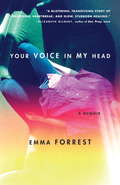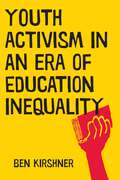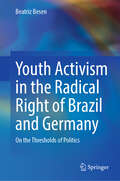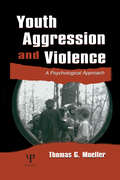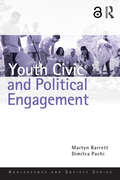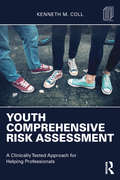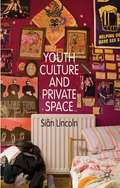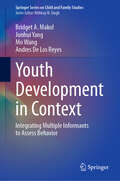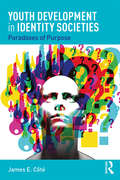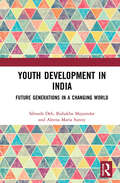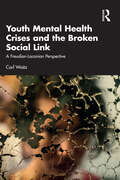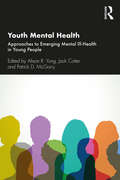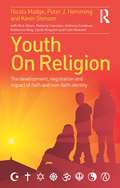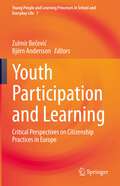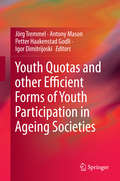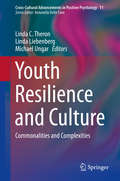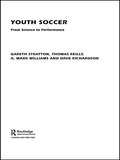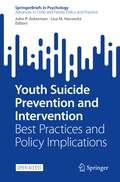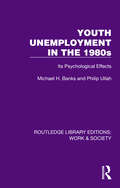- Table View
- List View
Your Undergraduate Degree in Psychology: From College to Career
by R. Eric Landrum Paul I. HettichInnovative strategies for psychology majors to survive and thrive in the workforceNearly 100,000 students graduate each year with a bachelor′s degree in psychology, and a majority of these students will enter the workforce instead of pursuing a graduate degree. Many will find themselves tentatively deciding their next steps amid a complex and changing economic and job environment.In this text, authors and professors Paul I. Hettich and R. Eric Landrum provide innovative strategies and tools for succeeding after college with an undergraduate degree in psychology. Drawing on current research data, applied theory, and both academic and workplace experiences, they help stimulate self-reflection and improve decision making as students approach their careers. The text covers key topics in the college-to-career transition, including career planning and development, identifying and transferring marketable skills, building and sustaining strong networks, understanding what employers want and don′t want, coping with personal life changes, becoming a valued employee, and more.
Your Undergraduate Degree in Psychology: From College to Career
by R. Eric Landrum Paul I. HettichInnovative strategies for psychology majors to survive and thrive in the workforceNearly 100,000 students graduate each year with a bachelor′s degree in psychology, and a majority of these students will enter the workforce instead of pursuing a graduate degree. Many will find themselves tentatively deciding their next steps amid a complex and changing economic and job environment.In this text, authors and professors Paul I. Hettich and R. Eric Landrum provide innovative strategies and tools for succeeding after college with an undergraduate degree in psychology. Drawing on current research data, applied theory, and both academic and workplace experiences, they help stimulate self-reflection and improve decision making as students approach their careers. The text covers key topics in the college-to-career transition, including career planning and development, identifying and transferring marketable skills, building and sustaining strong networks, understanding what employers want and don′t want, coping with personal life changes, becoming a valued employee, and more.
Your Voice in My Head
by Emma ForrestA dazzling and devastating memoir -- Girl Interrupted for the Juno generation.Talented, prolific and charming, Emma Forrest was settled in Manhattan at twenty-two and on contract to the Guardian when she realized that her quirks had gone beyond eccentricity, past the warm waters of weird and into those cold, deep patches of the sea where people lose their lives.Lonely, in a dangerous cycle of cutting and bulimia, and drawn inexplicably to damaging and cruel relationships, she found herself in the chair of a slim, balding and effortlessly optimistic psychiatrist -- a man whose wisdom and humanity would wrench her from the vibrant and dangerous tide of herself, and who would help her to recover when she tried to end her life.Emma's loving and supportive family and friends circled around her in panic. Like Ophelia, Emma was on the brink of drowning. But she was also still working, still exploring, still writing. And then she fell in love.One day, when Emma called to make an appointment with her psychiatrist, she found no one there. He had died, shockingly, at the age of fifty-three, leaving behind a young family for whom he had fought to survive. Processing the premature doorstep, a failed suicide, she was adrift. And when her significant and all-consuming relationship also fell apart, she was forced to cling to the page for survival.Your Voice in My Head is spiked with wit, humour and unique perception. It not only explores the crashing weight of depression, mania and suffering, but also the beauty of love and the heartbreak of loss. It is also, fundamentally, about our relationship with ourselves.From the Hardcover edition.
Yours, Faithfully: A page-turning and touching story by the #1 bestselling author
by Sheila O'FlanaganSheila O'Flangan's wonderfully gripping, dramatic and touching novel YOURS, FAITHFULLY is essential reading for fans of Marian Keyes and Freya North.Iona Brannock has always been impatient. Not one to hang around, she married her gorgeous husband just months after meeting him and they have lived happily ever since. Now all she needs is a baby and her life will be perfect. Sally Harper has been blissfully married for almost twenty years. She has a beautiful daughter, a loving husband and a great job. Her life is complete. But a surprise pregnancy is about to change everything.Two women - strangers leading separate lives. But their two worlds are about to collide in the most shocking way...What readers are saying about Yours, Faithfully:'This book is simply gorgeous! I love this book, I love the author and I am absolutely going to read more of her stories' Goodreads reviewer, 5 stars'This book put me inside an exquisite bubble of sympathy, suspense and contemplation' Goodreads reviewer, 5 stars'A real page-turner of how lives become intertwined because of one person. An excellent read - I enjoyed every bit of it' Amazon reviewer, 5 stars
Yours, Faithfully: A page-turning and touching story by the #1 bestselling author
by Sheila O'FlanaganSheila O'Flangan's wonderfully gripping, dramatic and touching novel YOURS, FAITHFULLY is essential reading for fans of Marian Keyes and Freya North.Iona Brannock has always been impatient. Not one to hang around, she married her gorgeous husband just months after meeting him and they have lived happily ever since. Now all she needs is a baby and her life will be perfect. Sally Harper has been blissfully married for almost twenty years. She has a beautiful daughter, a loving husband and a great job. Her life is complete. But a surprise pregnancy is about to change everything.Two women - strangers leading separate lives. But their two worlds are about to collide in the most shocking way...What readers are saying about Yours, Faithfully: 'This book is simply gorgeous! I love this book, I love the author and I am absolutely going to read more of her stories' Goodreads reviewer, 5 stars'This book put me inside an exquisite bubble of sympathy, suspense and contemplation' Goodreads reviewer, 5 stars'A real page-turner of how lives become intertwined because of one person. An excellent read - I enjoyed every bit of it' Amazon reviewer, 5 stars
Yours, Faithfully: A page-turning and touching story by the #1 bestselling author
by Sheila O'FlanaganSheila O'Flangan's wonderfully gripping and touching novel YOURS, FAITHFULLY is essential reading for fans of Emily Bleeker and Liane Moriarty. From the bestselling author of THE MISSING WIFE: 'Captivating... A page-turner that does not disappoint' Anne M. Miskewitch, Library Journal.Iona Brannock has always been impatient. Not one to hang around, she married her gorgeous husband just months after meeting him and they have lived happily ever since. Now all she needs is a baby and her life will be perfect. Sally Harper has been blissfully married for almost twenty years. She has a beautiful daughter, a loving husband and a great job. Her life is complete. But a surprise pregnancy is about to change everything.Two women - strangers leading separate lives. But their two worlds are about to collide in the most shocking way...
Youth Activism in an Era of Education Inequality (Qualitative Studies in Psychology #2)
by Ben KirshnerWinner, 2016 Best Authored Book presented by the Society for Research on AdolescenceDiverse case studies on how youth build political power during an era of racial and educational inequality in AmericaThis is what democracy looks like: Youth organizers in Colorado negotiate new school discipline policies to end the school to jail track. Latino and African American students march to district headquarters to protest high school closure. Young immigration rights activists persuade state legislators to pass a bill to make in-state tuition available to undocumented state residents. Students in an ESL class collect survey data revealing the prevalence of racism and xenophobia. These examples, based on ten years of research by youth development scholar Ben Kirshner, show young people building political power during an era of racial inequality, diminished educational opportunity, and an atrophied public square. The book’s case studies analyze what these experiences mean for young people and why they are good for democracy. What is youth activism and how does it contribute to youth development? How might collective movements of young people expand educational opportunity and participatory democracy? The interdependent relationship between youths’ political engagement, their personal development, and democratic renewal is the central focus of this book. Kirshner argues that youth and societal institutions are strengthened when young people, particularly those most disadvantaged by educational inequity, turn their critical gaze to education systems and participate in efforts to improve them.
Youth Activism in the Radical Right of Brazil and Germany: On the Thresholds of Politics
by Beatriz BesenThis book offers a comprehensive analysis of radical right youth activism in Brazil and Germany, examining the complex pathways of political engagement through innovative biographical and narrative research. By exploring the tensions between democratic and anti-democratic practices, the study reveals how young activists navigate political landscapes, uncovering the intricate relationships between conservative discourses, neoliberalism, and political identity formation. Drawing on political psychology and post-structuralist approaches, the author challenges traditional interpretations of youth political participation. Combining in-depth interviews and comparative analysis, the book sheds light on the motivations, discourses, and mechanisms that have driven and sustained their engagement. By offering a comparative perspective, it reveals both the specific national dynamics and the transnational patterns that characterize radical right youth activism today. Youth Activism in the Radical Right of Brazil and Germany: On the Thresholds of Politics is essential for scholars of psychology, politics and sociology, as well as for students and policymakers seeking to understand the growing youth engagement in radical right-wing movements and its challenges for contemporary democracy.. The original manuscript of this book was written in Brazilian Portuguese and translated into English with the help of artificial intelligence. A subsequent human revision was done primarily in terms of content.
Youth Aggression and Violence: A Psychological Approach
by Thomas G. MoellerThe rash of school shootings in the late 1990s has generated a tremendous amount of public concern about youth aggression and violence. But students, trainees, and professionals who work with children and adolescents have had no concise or systematic survey of our current knowledge about causes and effective approaches to intervention and prevention on which to draw. Youth Aggression and Violence has filled the void. Comprehensive and readable, it: * utilizes theory and research from the developmental psychology of "normal" children and adolescents, as well as material on "abnormal" forms of development, such as disruptive behavior disorders and juvenile delinquency; * situates youthful aggression and violence within the overall framework of children's moral development; * integrates quantitative research with carefully considered qualitative research and case studies; * discusses the genetic and biological underpinnings of youthful aggression, as well as family and social factors related to antisocial behavior; * emphasizes cognitive, motivational, and emotional processes involved in youth aggression and violence; * provides in-depth coverage of juvenile killers and school violence; * examines female aggression and violence in a variety of contexts; and * critically examines a number of questions frequently discussed in conjunction with youth violence, such as media violence, firearm accessibility, and the relationship between self-esteem and aggression.
Youth Civic and Political Engagement (Adolescence and Society)
by Martyn Barrett Dimitra PachiWhat exactly is civic and political participation? What factors influence young people’s participation? How can we encourage youth to actively participate in their own democracies? Youth Civic and Political Engagement takes a multidisciplinary approach to answering these key questions, incorporating research in the fields of psychology, sociology, political science and education to explore the issues affecting youth civic and political engagement. Drawing on evidence that has been obtained in many different national contexts, and through multinational studies, this book provides a theoretical synthesis of this large and diverse body of research, using an integrative multi-level ecological model of youth engagement to do so. It identifies unresolved issues in the field and offers numerous suggestions for future research. Youth Civic and Political Engagement is an invaluable resource for researchers, teachers, youth workers, civil society activists, policymakers and politicians who wish to acquire an up-to-date understanding of the factors and processes that influence young people’s civic and political engagement, and how to promote youth engagement.
Youth Civic and Political Engagement (ISSN)
by Martyn Barrett Dimitra PachiWhat exactly is civic and political participation? What factors influence young people’s participation? How can we encourage youth to actively participate in their own democracies? Youth Civic and Political Engagement takes a multidisciplinary approach to answering these key questions, incorporating research in the fields of psychology, sociology, political science and education to explore the issues affecting youth civic and political engagement.Drawing on evidence that has been obtained in many different national contexts, and through multinational studies, this book provides a theoretical synthesis of this large and diverse body of research, using an integrative multi-level ecological model of youth engagement to do so. It identifies unresolved issues in the field and offers numerous suggestions for future research.Youth Civic and Political Engagementis an invaluable resource for researchers, teachers, youth workers, civil society activists, policymakers and politicians who wish to acquire an up-to-date understanding of the factors and processes that influence young people’s civic and political engagement, and how to promote youth engagement.Chapters 1, 2, 3, and 4 of this book are freely available as downloadable Open Access PDFs at http://www.taylorfrancis.com under a Creative Commons Attribution-Non Commercial-No Derivatives (CC-BY-NC-ND) 4.0 license.
Youth Comprehensive Risk Assessment: A Clinically Tested Approach for Helping Professionals
by Kenneth M. CollYouth Comprehensive Risk Assessment: A Clinically Tested Approach for Helping Professionals presents a complete youth risk assessment and treatment program based on Dr. Ken Coll's 20 plus years of research on assessing and treating at-risk youth. In this book, helping professionals will find not only a wide range of succinct and easy-to-use assessments, but also proven helpful, highly specific approaches and treatment strategies. Case studies and intervention techniques show professionals—from therapists and social workers to teachers and nurses—how they can help struggling youth find motivation to work on their concerns. This book also offers professionals a menu of assessment surveys and action strategies so that they can develop a plan that best fits the needs of particular youth and their families.
Youth Culture and Private Space
by Siân LincolnSi#65533;n Lincoln considers the use, role and significance of private spaces in the lives of young people. Drawing on extensive ethnographic research, she explores the place of 'the private' in youth cultural discourses, both historically and contemporarily, that until now have remained largely absent in youth cultural research.
Youth Development in Context: Integrating Multiple Informants to Assess Behavior (Springer Series on Child and Family Studies)
by Mo Wang Andres De Los Reyes Bridget A. Makol Junhui YangThis book investigates the most common approach to assessing behavior in youth development. It explores use of multiple informants who each observe youth in the social contexts that typify their everyday lives, including parents, teachers, peers, and youth themselves. The volume characterizes the most common outcome from taking this assessment approach — the discrepant results or estimates about behavior that informants’ reports often produce. Grounded in the Operations Triad Model — the foundational framework for contemporary scholarship about discrepant results — this book focuses on strategies that discrepant results compel scholars to implement, namely strategies for integrating these results. The book highlights that the integrative strategies scholars have historically used prevent them from capitalizing on the valid data that discrepant results often contain. This authoritative, thoroughly resourced, and methodologically rigorous book provides readers with integrative strategies that align with scholarship in youth development. In doing so, the book provides readers with a paradigm for testing competing data integration strategies, using a sophisticated suite of Monte Carlo Simulation and measurement validation tools that are applicable to a host of assessment scenarios in scholarship on youth development. Key areas of coverage include: Use of multiple informants to assess behavior in youth development. The frequent observation of discrepant results when assessing behavior in youth development. Theoretical models for explaining discrepant results in behavior assessments and how they inform strategies for integrating assessment data. Key distinctions in the assumptions that underlie the use of competing integrative strategies. Application of Monte Carlo Simulation strategies for testing competing integrative strategies. Implementation of measurement validation strategies that put competing integrative strategies to the test, within data conditions that typify research in youth development. Youth Development in Context is an essential resource for researchers, professors, graduate students as well as clinicians, therapists, and other professionals in developmental psychology, social work, public health, pediatrics, family studies, child and adolescent psychiatry, school and educational psychology, and all interrelated disciplines. This book investigates the most common approach to assessing behavior in youth development. It explores use of multiple informants who each observe youth in the social contexts that typify their everyday lives, including parents, teachers, peers, and youth themselves. The volume characterizes the most common outcome from taking this assessment approach — the discrepant results or estimates about behavior that informants’ reports often produce. Grounded in the Operations Triad Model — the foundational framework for contemporary scholarship about discrepant results — this book focuses on strategies that discrepant results compel scholars to implement, namely strategies for integrating these results. The book highlights that the integrative strategies scholars have historically used prevent them from capitalizing on the valid data that discrepant results often contain. This authoritative, thoroughly resourced, and methodologically rigorous book provides readers with integrative strategies that align with scholarship in youth development. In doing so, the book provides readers with a paradigm for testing competing data integration strategies, using a sophisticated suite of Monte Carlo Simulation and measurement validation tools that are applicable to a host of assessment scenarios in scholarship on youth development. Key areas of coverage include: Use of multiple informants to assess behavior in youth development. The frequent observation of discrepant results when assessing behavior in youth development. Theoretical models
Youth Development in Identity Societies: Paradoxes of Purpose
by James E. CoteThis book explores the causes and consequences of the contradictions in young people’s lives stemming from the affluence–purpose paradox: a lack of purpose-in-life among many of those living in the most affluent societies in human history. This paradox is endemic to identity societies where people experience a choice-contingent life course, and is examined using an interdisciplinary approach—largely with an integration of developmental psychology and sociology, but also using historical, anthropological, economic, and political perspectives. The transition to adulthood is now commonly a prolonged process, with young people facing a number of psychological challenges and sociological obstacles in their identity formation. Challenges include difficulties in making prudent choices about goals. Obstacles involve cross-pressures in the wider society as well as in educational institutions. Consequently, many youth experience their education as alienating and stressful rather than as an opportunity for personal development. Those without a sense of purpose have more difficulties with their identity formation that can produce symptoms of anxiety and depression. The current student mental health crisis is examined in this context. An additional challenge is an ambiguously defined adulthood. Young people who are confused about appropriate adult roles often value hedonistic activities rooted in narcissism and materialism rather than in more fulfilling long-term goals. Conversely, those who are agentic in their personal development can thrive in adulthood, especially when they combine agency with generativity. This book ends with a series of recommendations for researchers and policy makers to help youth cope with the affluence–purpose paradox.
Youth Development in India: Future Generations in a Changing World
by Sibnath Deb Aleena Maria Sunny Bishakha MajumdarThis book provides a comprehensive understanding of youth development and protection in the Indian context. It reviews the demographic and socio-economic background and future prospects of Indian youth. The book discusses the role of family and culture in the upbringing and development of youth, changing political and socio-economic situations, and the influence of parents and teachers in shaping the future of the youth. The book highlights the nature of adversities faced by children and youth and the subsequent impact on their mental health and well-being. It also examines the efficacy of various skill development programmes and national and international policies designed for the youth. The book will be of interest to students, teachers, and researchers of population sciences, population studies, psychology, childhood studies, development studies, sociology, and youth studies. It will also be of interest to policymakers and NGOs working with children and youth.
Youth Mental Health Crises and the Broken Social Link: A Freudian-Lacanian Perspective
by Carl WaitzThis book critically examines the circumstances surrounding the failure of rites of passage in U.S. society and its relationship with the mental health crisis overtaking youth in America today.The book develops a Freudian understanding of rites of initiation and the larger social link, based on Freud’s psychoanalytic myths read through a Lacanian lens. It further surveys the deterioration of common civil identifications in the United States, the advancement of consumer capitalism in the late 20th century, and the development of social media in the 21st century as each composing a tectonic shift destabilizing the traditional function of the rite of initiation. As a result, adolescents today have no reliable method of entering the social link through symbolic identification, nor the ability to use it to bind their libido. The book traces the clinical consequences of this failure to the recent waves of mass psychogenic illness in adolescents, the rocketing increase in psychiatric hospitalizations, and the dramatic rise in suicidal thoughts and behaviours in the past years. It also offers possible pathways forward for both adolescents and psychoanalytic clinicians working with them.Drawing on multiple psychoanalytic schools of thought and clinical experience, this book is a vital resource for psychoanalysts, psychotherapists, and clinicians working with adolescents.
Youth Mental Health: Approaches to Emerging Mental Ill-Health in Young People
by Patrick D. McGorry Alison R. Yung Jack CotterThis book highlights the field of youth mental health and why it is a specialty distinct from both child and adolescent and adult mental health. Youth Mental Health: Approaches to Emerging Mental Ill-Health in Young People examines issues such as mental health literacy, e-Health, family, psychological, vocational and pharmacological interventions. The authors also discuss issues that are particularly pertinent to young people, such as suicidality, substance abuse, gender identity and sexuality, attention deficit disorder and eating disorders. Taking a preventative focus, this book presents evidence for youth mental health as an important and growing field, makes the case for the reform of existing service structures to better serve this group and outlines the latest specialised approaches to treatment. Drawing on the knowledge and expertise of leading thinkers in youth mental health, this book is instrumental for mental health professionals who wish to design new specialised mental health systems for young people.
Youth On Religion: The development, negotiation and impact of faith and non-faith identity
by Nicola Madge Kevin Stenson Peter HemmingGlobalisation has led to increasing cultural and religious diversity in cities around the world. What are the implications for young people growing up in these settings? How do they develop their religious identities, and what roles do families, friends and peers, teachers, religious leaders and wider cultural influences play in the process? Furthermore, how do members of similar and different cultural and faith backgrounds get on together, and what can young people tell us about reducing conflict and promoting social solidarity amid diversity? Youth On Religion outlines the findings from a unique large-scale project investigating the meaning of religion to young people in three multi-faith locations. Drawing on survey data from over 10,000 young people with a range of faith positions, as well as a series of fascinating interviews, discussion groups and diary reports involving 160 adolescents, this book examines myriad aspects of their daily lives. It provides the most comprehensive account yet of the role of religion for young people growing up in contemporary, multicultural urban contexts. Youth On Religion is a rigorous and engaging account of developing religiosity in a changing society. It presents young people’s own perspectives on their attitudes and experiences and how they negotiate their identities. The book will be an instructive and valuable resource for psychologists, sociologists, criminologists, educationalists and anthropologists, as well as youth workers, social workers and anyone working with young people today. It will also provide essential understanding for policy makers tackling issues of multiculturalism in advanced societies.
Youth Participation and Learning: Critical Perspectives on Citizenship Practices in Europe (Young People and Learning Processes in School and Everyday Life #7)
by Björn Andersson Zulmir BečevićThis book contributes to the studies on learning processes occurring outside “traditional” socialization settings such as family and school, by analysing civic and political participation and learning experiences. In this perspective, the book delves into the connections between the concepts of learning and participation and, in various ways and from different perspectives, critically interrogates learning and participation as interrelated phenomena, with the aim of revealing complexities implicated in pathways to adulthood. Being interdisciplinary in its nature (contributors come from disciplinary backgrounds such as educational sciences, child and youth studies, social work, sociology and political science), the volume provides an up-to date analysis of contemporary issues connected to youth participation and learning. The work taps into central areas of everyday life of young people and youth meaning-making and generates and presents qualitative knowledge about what it means to be young in Europe today.
Youth Quotas and other Efficient Forms of Youth Participation in Ageing Societies
by Jörg Tremmel Antony Mason Petter Haakenstad Godli Igor DimitrijoskiThis book examines ways to ensure that the rights, interests and concerns of young people are properly represented in Western democracies. One new proposal is the introduction of youth quotas in political institutions in order to counter the possible marginalization of young people caused by demographic ageing and, thereby, an overrepresentation of the interests of the elderly. The book explores key questions regarding the implementation of youth quotas from different perspectives, including philosophy, political science, sociology and demography. It examines whether youth quotas and other measures that give the young more voice and influence in political institutions are a good means for promoting the cause of intergenerational justice. In particular, it investigates how and if youth quotas can be used to ensure that the environmental interests of young and future generations are being taken into account. In addition, the book introduces an innovative model that would give a right to vote to minors without voting age boundaries. The book also discusses suffrage reforms through lowering the voting age in Western countries, as well as introducing methods especially aimed at raising the skills of children necessary for societal citizenship and empowerment of young citizens. The volume will help raise awareness and knowledge about the intergenerational implications of demographic changes in Western democracies, where ageing societies are increasingly turning into gerontocracies. It offers readers deep insight into how youth quotas in particular (and others forms of youth participation in general) might be efficient methods to ensure that younger generations are included in the political decision making process and other activities in society.
Youth Resilience and Culture
by Michael Ungar Linda Liebenberg Linda C. TheronUntil researchers and theorists account for the complex relationship between resilience and culture, explanations of why some individuals prevail in the face of adversity will remain incomplete. This edited volume addresses this crucial issue by bringing together emerging discussions of the ways in which culture shapes resilience, the theory that informs these various studies, and important considerations for researchers as they continue to investigate resilience. Using research from majority and minority world contexts, 'Youth Resilience and Culture: Commonalities and Complexities' highlights that non-stereotypical, critical appreciation of the cultural systems in which youth are embedded, and/or affiliate with, is pivotal to understanding why particular resilience processes matter for particular youth in a particular life-world at a particular point in time. In doing so, this book sensitizes readers to the importance of accounting for the influence of cultural contexts on resilience processes, and to the danger of conceptualising and/or operationalising resilience, culture, and their interplay, simplistically or idealistically. In short, the progressive contents of 'Youth Resilience and Culture: Commonalities and Complexities' make it an essential read for resilience-focused scholars, students, academics, and researchers, as well as policy makers, practitioners, and humanitarian workers engaged with high-risk populations.
Youth Soccer: From Science to Performance
by Thomas Reilly A. Mark Williams Gareth Stratton Dave RichardsonAs the adult game has increased in popularity, youth soccer has also seen significant expansion in recent years. The popularity of the youth game is set to continue. Young boy and girl players wish to emulate professional soccer stars and the professional game, often with long-term financial rewards in mind, is increasingly keen to develop young talent. Applied sports science is now a well-established feature of the adult game but the sports science that supports modern football does not translate directly into the youth game. The coaches of young players need specific information about children. Themes explored in this text include: growth of physiological systems development of motor and perceptive skills paediatric environmental physiology prevention of injury diet and nutrition youth fitness and skills training effective teaching and coaching of juniors the role of football academies. Youth Soccer: From Science to Performance blends current child-focused sports science theory with youth-specific coaching practice to help create soccer development strategies for children. It promotes knowledge and understanding in all these areas and will further professional expertise amongst coaches who wish to develop the all year round potential of youth soccer players and train the stars of the future.
Youth Suicide Prevention and Intervention: Best Practices and Policy Implications (SpringerBriefs in Psychology)
by John P. Ackerman Lisa M. HorowitzThis open access book focuses on the public health crisis of youth suicide and provides a review of current research and prevention practices. It addresses important topics, including suicide epidemiology, suicide risk detection in school and medical settings, critical cultural considerations, and approaches to lethal means safety. This book offers cutting-edge research on emerging discoveries in the neurobiology of suicide, psychopharmacology, and machine learning. It focuses on upstream suicide prevention research methods and details how cost-effective approaches can mitigate youth suicide risk when implemented at a universal level. Chapters discuss critical areas for future research, including how to evaluate the effectiveness of suicide prevention and intervention efforts, increase access to mental health care, and overcome systemic barriers that undermine generalizability of prevention strategies. Finally, this book highlights what is currently working well in youth suicide prevention and, just as important, which areas require more attention and support. Key topics include: The neurobiology of suicide in at-risk children and adolescents.The role of machine learning in youth suicide prevention.Suicide prevention, intervention, and postvention in schools.Suicide risk screening and assessment in medical settings.Culturally informed risk assessment and suicide prevention efforts with minority youth.School mental health partnerships and telehealth models of care in rural communities.Suicide and self-harm prevention and interventions for LGBTQ+ youth.Risk factors associated with suicidal behavior in Black youth.Preventing suicide in youth with autism spectrum disorder (ASD) and intellectual disability (ID). Youth Suicide Prevention and Intervention is a must-have resource for policy makers and related professionals, graduate students, and researchers in child and school psychology, family studies, public health, social work, law/criminal justice, sociology, and all related disciplines.
Youth Unemployment in the 1980s: Its Psychological Effects (Routledge Library Editions: Work & Society)
by Philip Ullah Michael H. BanksYouth unemployment is one of the most critical problems generated by any recession. Widespread changes in the structure of the youth labour market, together with the increasing affluence amongst the employed, meant that the experience of unemployment for young people in the 1970s and 1980s was quite different from that of previous decades. Originally published in 1988, this book examines the psychological consequence of prolonged periods of joblessness among a national cohort of 16-19 year olds. It places the problem in a historical context and then examines evidence for the effect of unemployment on the work ethic, motivation to work, the search for jobs, psychological health, political views, lifestyles and early careers. Particular attention is paid to gender and ethnic group differences. Original research was integrated with existing literature with the aim of bringing together a wide variety of studies and theoretical positions previously dispersed throughout the literature.

